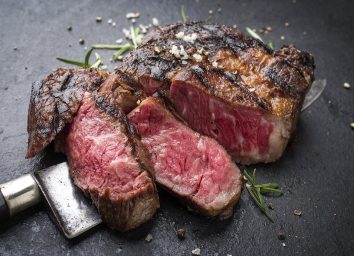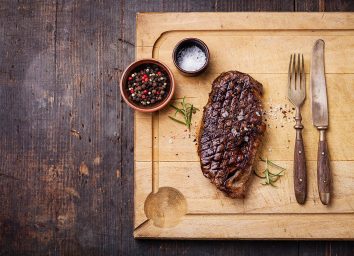What Happens When You Eat Ground Beef, Says Science
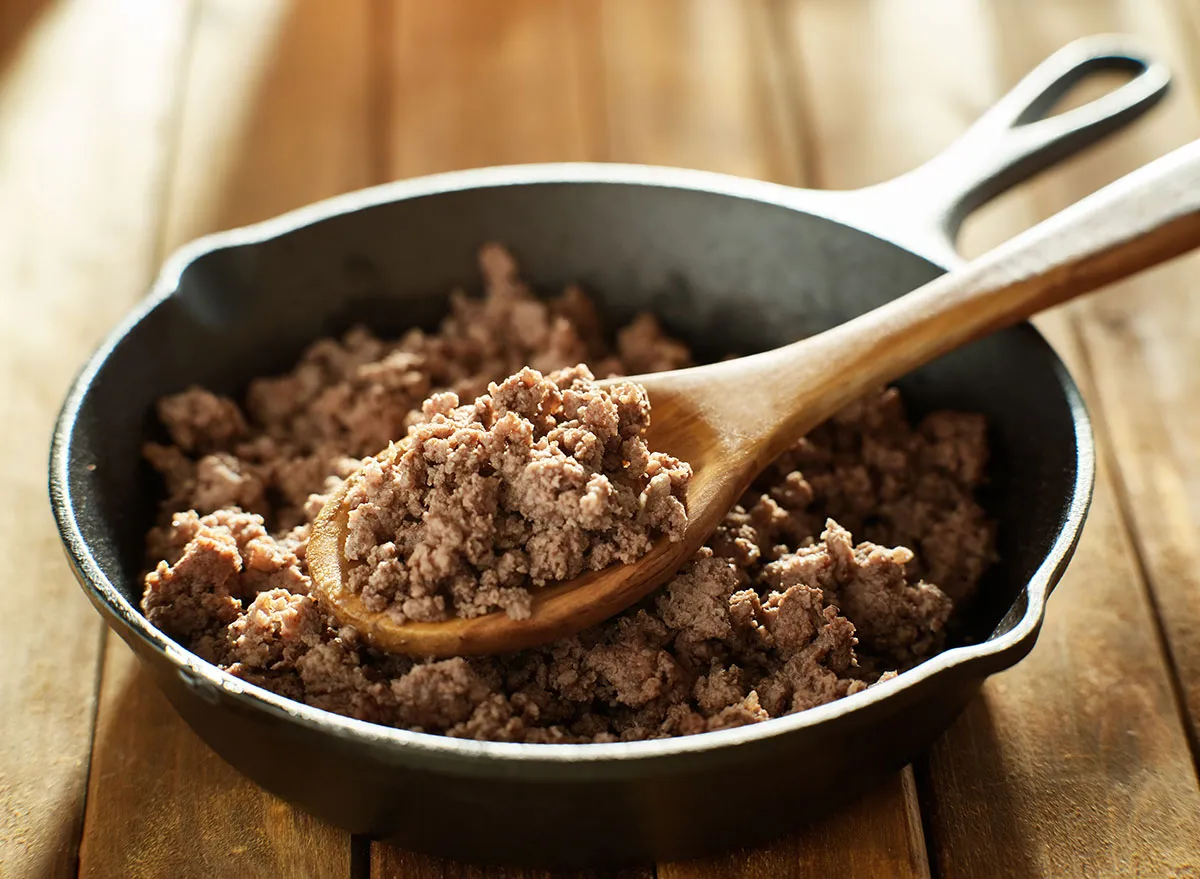
Despite the increasing allure of following a plant-based diet, Americans still love to eat beef, consuming about 4.5 servings per week, according to the Centers for Disease Control and Prevention. And they especially adore their ground beef, which makes up more than 46% of total US retail beef consumption.
Now that we’re on the cusp of backyard grilling season, you’ll likely stock up on your share of burger meat and may be interested in knowing what you’re getting when you eat all that ground beef. Here’s what happens to your body when you eat ground beef, and for even more tips, be sure to read up on our list of 100 Unhealthiest Foods on the Planet.
You get nearly half of your daily protein needs.
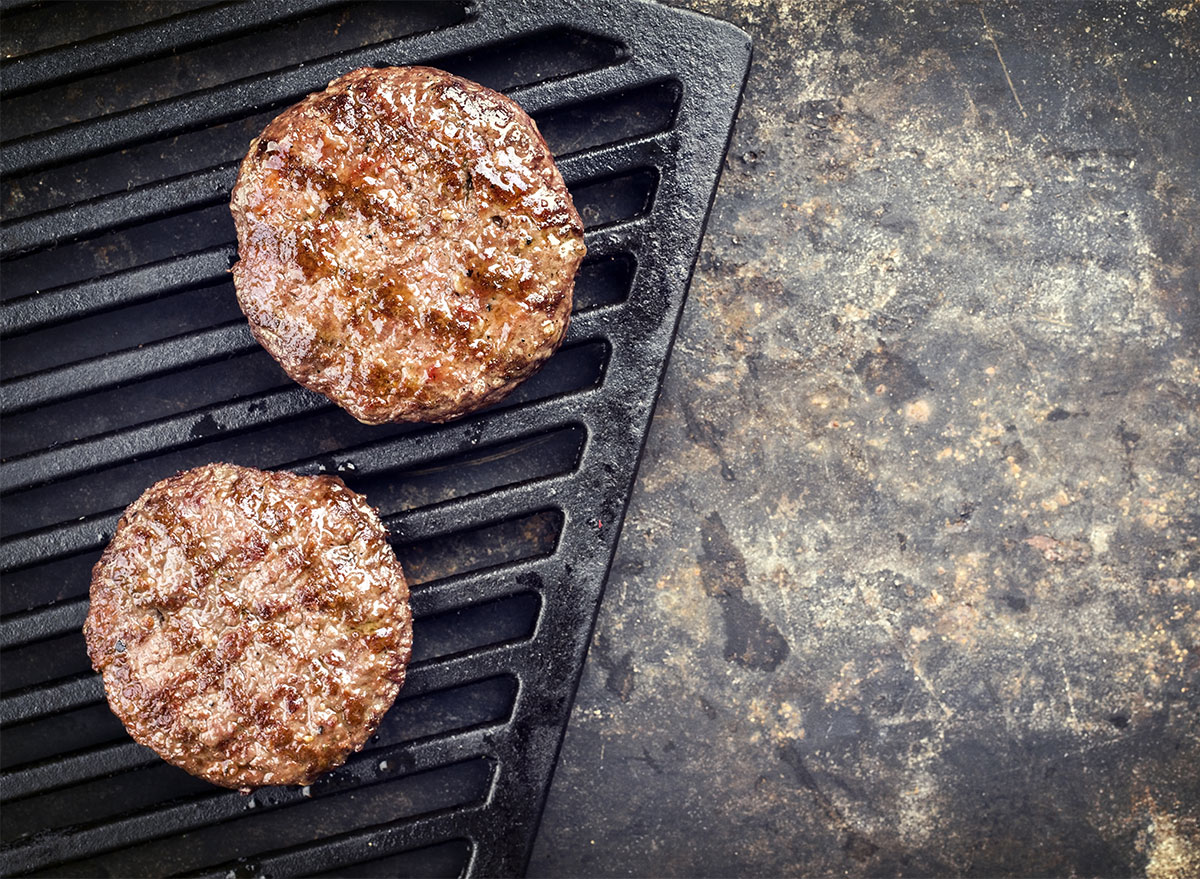
A quarter-pound burger made with 80/20 ground beef (80% lean / 20% fat) delivers about 20 grams of protein, which is a little less than half of the Dietary Reference Intake (DRI) of 46 grams per day for the average sedentary women and 56 grams for the average sedentary man.
Protein is a building block macronutrient essential for the growth and repair of muscle, tissue, and bone. It helps make hormones and also carries oxygen throughout your body in your bloodstream. It can be an important macronutrient for weight control because it is more satiating than carbs.
But as critical as protein is for good health, do you need to load up on red meat to get your fill? Not at all. Protein deficiency is rare in the United States. “Nature has made sure we are protected against protein deficiency,” writes nutritionist Jeff Novick, RD, vice president of health promotion for Executive Health Exams International. “Whole grains, vegetables, and legumes are all excellent sources of high-quality protein.” Here are 11 Health Benefits of Plant Protein.
You might develop gout and kidney stones.

Regular consumption of ground beef may affect your joints and kidneys. Whenever you eat animal protein, especially red meat, your uric acid levels can rise. Uric acid buildup in the bloodstream can cause crystals to form in the joints (gout) and combine into uric stones in the kidneys. Both are extremely painful.
The connection between animal protein and kidney stones is well-documented. In one British study in Clinical Science, men who ate the equivalent of an extra 4 ounces of ground beef each day increased their excretion of uric acid by 48% and the odds of developing kidney stones by 250%.
To keep things healthy, The World Cancer Research Fund recommends limiting consumption to about three portions (12-18 oz.) of cooked unprocessed red meat per week. This is a great goal to set for yourself, and a motivation to start eating leaner sources of protein throughout the week.
Get even more healthy eating tips straight to your inbox by signing up for our newsletter!
You will consume a lot of calories.

Ground beef packs significant calories in a small package. A typical sit-down restaurant hamburger, about 120 grams of ground beef, for example, contains 326 calories. Make it a double-meat cheeseburger with bacon (plus bun and condiments) and you can see how the calories in that meal can add up to nearly half a day’s worth.
At home, you can make your meaty meals with leaner versions of ground beef, like ground round (14% fat) and ground sirloin (10% fat). But you’ll taste the difference 20% fat ground chuck makes in a burger on the grill.
Speaking of grilling, You’ve Been Grilling Your Burgers All Wrong.
Your arteries might stiffen up.

Eating a meal made with ground beef may have an immediate effect on your cardiovascular system, according to a review in the journal Nutrients. The review of hundreds of studies found a large body of evidence showing that a meal containing high saturated fat, with or without high sugar content, triggers low-grade inflammation and endothelial dysfunction. The endothelium is the thin lining of the blood vessels. Inflammation damages the endothelial cells, causing the arteries to become less pliable and more prone to narrowing (atherosclerosis) and restricting blood flow.
If you are concerned about the saturated fat content in ground beef, one option to consider is switching to beef sourced from grass-fed cattle.
“Grass-fed beef usually contains less total fat than grain-fed beef, which means that gram for gram, grass-fed beef contains fewer calories, too,” says nutritionist Lisa Richards, author of The Candida Diet. “Grass-fed beef also contains a higher amount of healthy fats, including omega-3s and conjugated linoleic acid than grain-fed beef.”
Plus, you’ll also get more antioxidant vitamins A and E from grass-fed beef, she says. You’ll even get a small amount of omega-3 fatty acids!
It may be harder to focus.
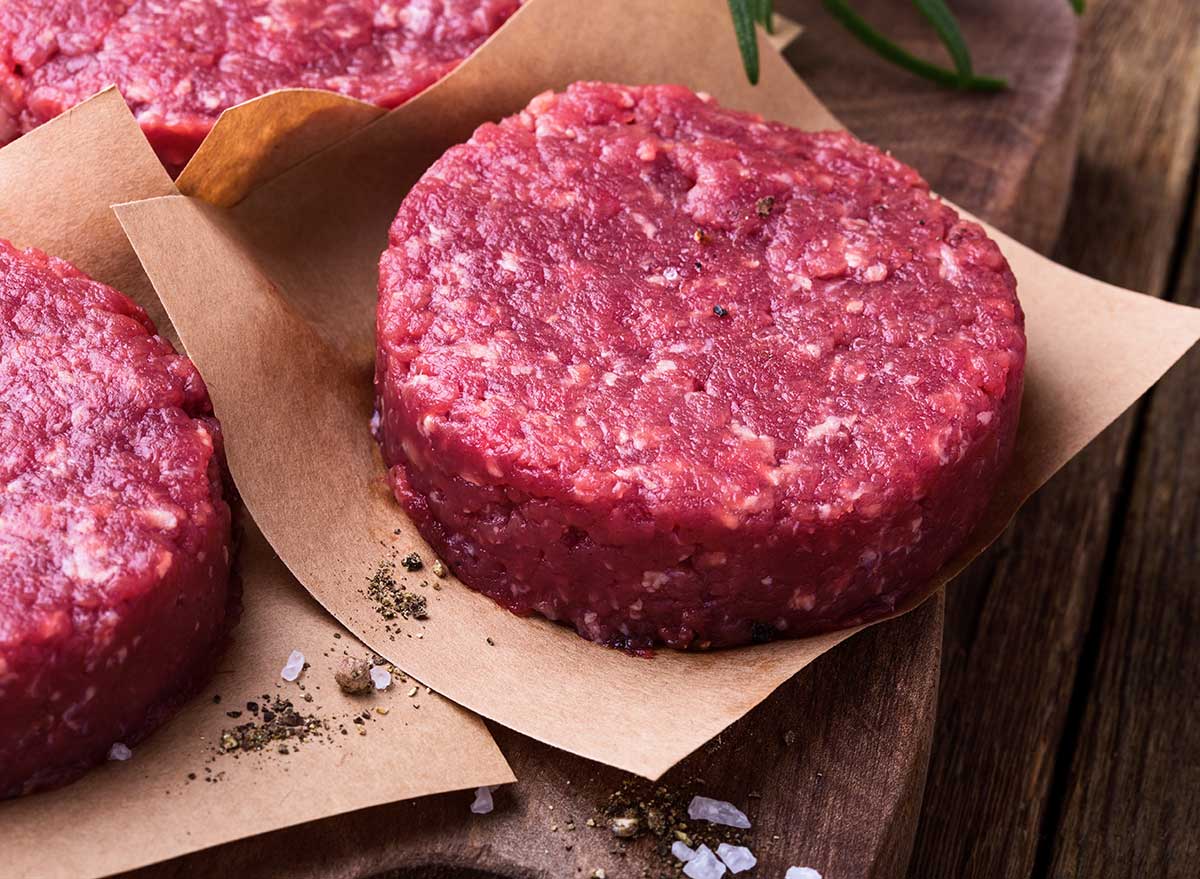
A meal high in saturated fat, like one made up of ground beef, eaten a few hours before taking a test or working on a task requiring high concentration may hinder your ability to focus, according to a study published in 2020 in the American Journal of Clinical Nutrition. Researchers randomly divided a group of women into two sections: one that ate a meal high in saturated fats and the second given a healthier meal containing lower amounts of saturated fats. Both meals were identical in calories and designed to mimic the contents of a fast-food hamburger meal. Five hours later, all the women were given attention-based tests. Over the next few weeks, the groups switched meals and took more tests. Results showed that after eating the high-saturated fat meal, all of the women performed an average of 11% poorer. In addition, the test-takers response times were more erratic and they were less able to sustain their attention for the full 10 minutes of the test.
Your bones might suffer.

People suffering from osteoporosis are sometimes advised to limit red meat consumption because too much animal protein may leach calcium from bone. A 2017 study in Advances in Nutrition suggests that reducing intake of red meats and other staples of the Western Diet, namely, soft drinks, refined grains, fried foods, and desserts, improved bone mineral density, which can decrease fracture risk.
Related: This Diet Is Bad for Your Bones, New Study Finds
Eating a lot of it is associated with cancer.
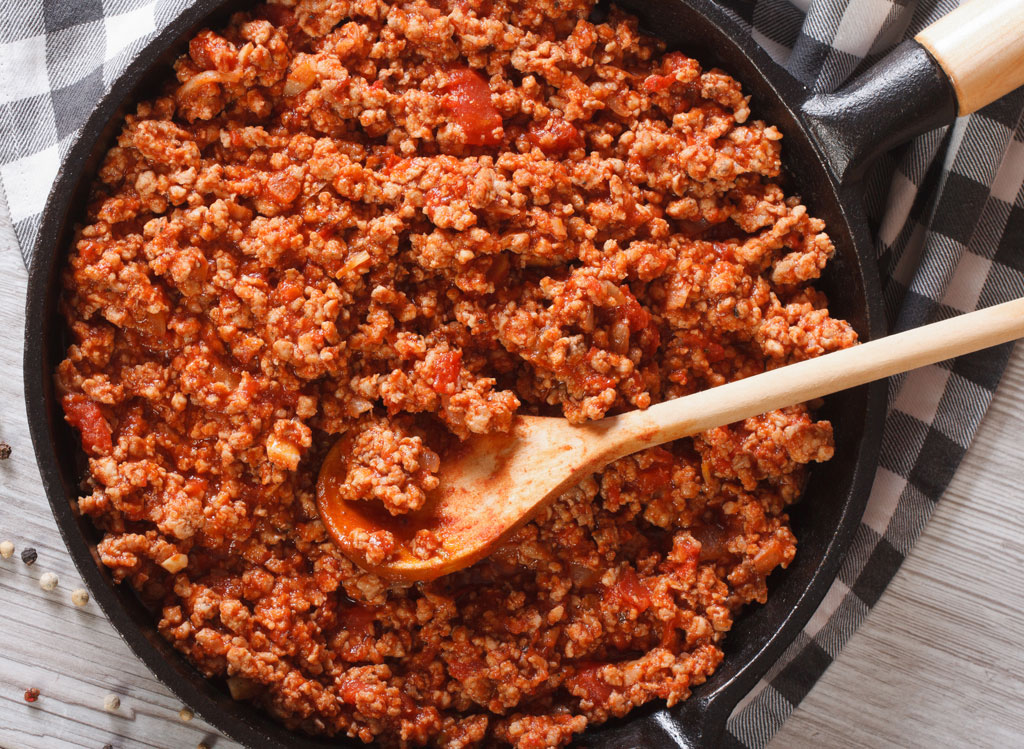
In 2015 the World Health Organization’s International Agency for Cancer Research announced that eating red meat and processed meats like bacon is associated with an increased risk of colorectal cancer. The IACR classified red meat, such as beef, lamb, and pork, as a Group 2A carcinogen, meaning it probably causes cancer. While not everyone sees red meat as the bogeyman of a healthy diet, most medical experts agree that it’s wise to avoid eating too much meat. The American Institute for Cancer Research, for example, recommends limiting red meat to just three portions a week, and no more than 18 ounces in total.
Related: One Major Side Effect of Eating Processed Meat.
You could be hastening your demise.
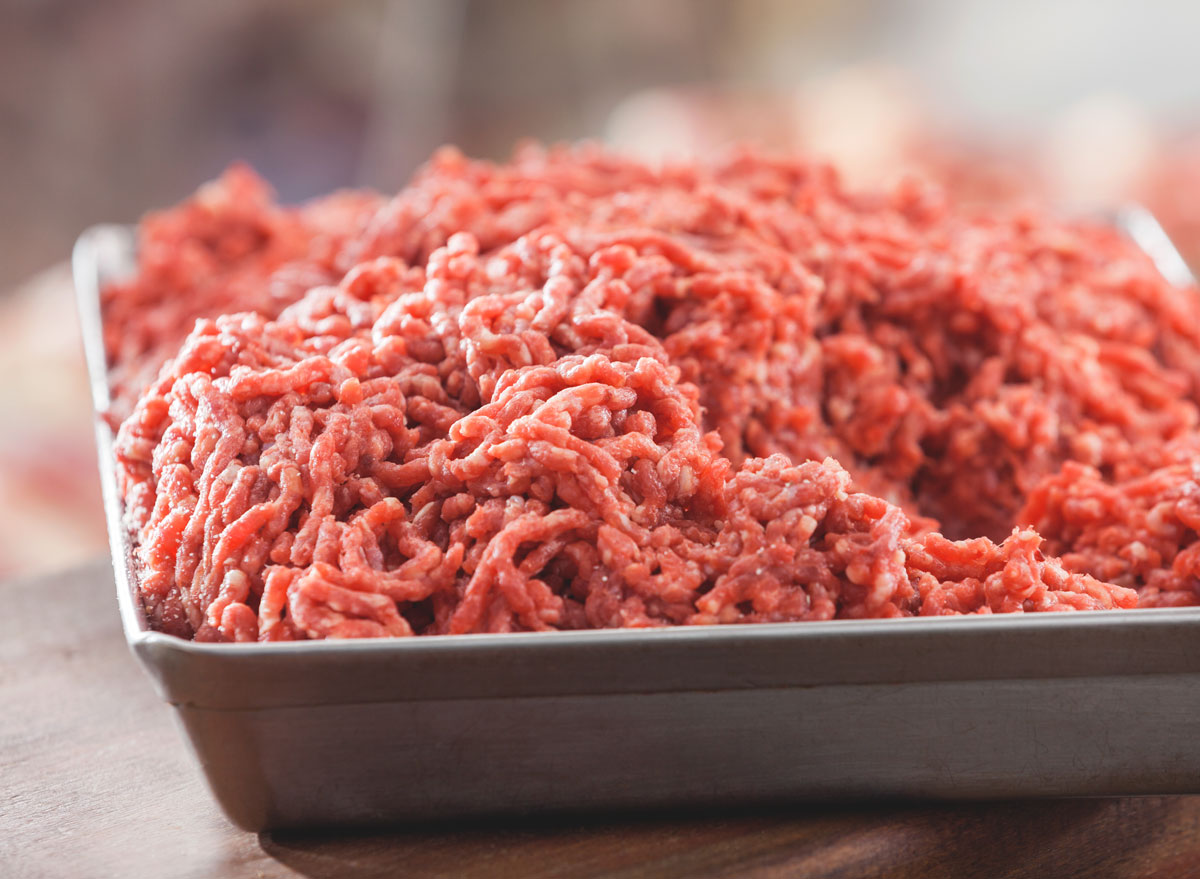
Many studies have demonstrated an association between eating red meat and increased risk of chronic diseases and death from all causes. One large study, for example, analyzed health and lifestyle data from studies on more than 120,000 men and women for more than 20 years. The results published in the Archives of Internal Medicine showed a 12% elevated risk of total mortality for people who consumed one serving of red meat per day and a 20% risk boost for those who ate processed red meat. It’s worth noting that the researchers point out that men and women who ate more red meat consumed lower amounts of fruits, vegetables, and whole grains and were less likely to be physically active and more likely to have a higher Body Mass Index.
However, another study in a population known for living a far healthy lifestyle and eating much less meat also linked all-cause death with red meat consumption. The study published in Nutrients in 2019 analyzed data on Seventh-day Adventists, a Christian faith whose members typically eat a whole foods diet, abstain from alcohol, and limit animal products. When compared with participants who ate no red meat, Seventh-day Adventists who reported a low-to-moderate intake of red meat (90% consumed about a half serving a day) showed a moderately higher risk of all-cause mortality as well as death from cardiovascular disease.
“Diets high in saturated fat have been associated with increased risk for the number one killer of Americans, heart disease,” says nutritionist Jana Mowrer, MPH, RD, founder of HealthWins.org. “Even though there’s a lot of controversy over saturated fat in our diet right now, I’m on the side which still believes we need to monitor our saturated fat intake because these fats are from highly processed foods and animal sources and they crowd out other more nutrient-dense foods such as fruits and vegetables. The keto diet, for example, concerns me with its emphasis on high-fat intake, which often ends up being a diet very low in fiber.”
Boost your intake of this good-gut-bug growing nutrient with 20 Easy Ways to Add Fiber to Your Diet.
